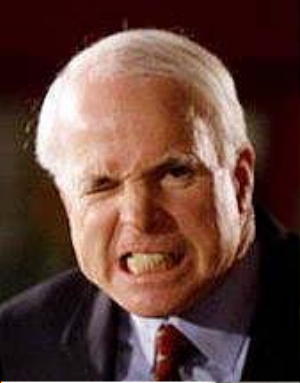 Unless you live in a cave you must have heard about the NYT story about Johnny Mac's possible tryst and inappropriate relationship with lobbyist Vicki Iseman.
Unless you live in a cave you must have heard about the NYT story about Johnny Mac's possible tryst and inappropriate relationship with lobbyist Vicki Iseman.Last night, before I went out for the evening, I listened to Keith Olbermann read this article aloud on MSNBC. I thought to myself, man this just does not seem substantial at all. A plan hatched, as soon as I got home, I was going to write a piece excoriating the NYT for its shabby journalism and the liberal blogosphere for hopping on board like we're some sort of inverse Dittoheads.
Sadly, my best laid plans were derailed, because the truth is I simply did not have enough respect for the liberal intelligencia. Greg Sargent, at TPM, had an excellent column discussing the legitimacy of the NYT writing. Kevin Drum of the estimable Washington Monthly was also critical. As were many of the other members of the liberal blogosphere. I am a huge cynic, but sometimes it's nice to see that while liberals can be awfully self-righteous, there are occasions on which we are deservedly so. That said, I would just point out that while the media is perfectly willing to challenge one of its own in protection of John McCain, they are way less likely to do so for Hillary Clinton. It's an odd dynamic, I would contend, however, if a story this sketchy about a Clinton scandal were to be published a lot fewer people would be upset and many more would be likely to simply believe it on face.
There are numerous interesting questions that this article raises, but one of the ones that hearkens back to the days of Watergate is what is the role of unnamed and background sources in publishing a story. Back when Woodward and Bernstein were attempting to establish the picture of the Watergate scandal, they often ran in to sources who were unwilling or could not go on the record (like FBI #2 man, Mark Felt, better known as Deep Throat). There was a real tension behind trusting information as an institution and putting out information the public will trust. The relevance to this article is that there is much speculation that the four reporters who penned this article all feel very strongly that they have this story, and it may be because of sources and evidence that they simply cannot release to the public.
So the question this raises in my mind is: Is it acceptable to publish something you absolutely know to be true, but cannot provide the evidence for reasons of journalistic ethics? On one hand, it seems like this is somewhat reasonable. If a news source has built up a level of credibility to the point that they can be trusted to establish fact to such a high level that they are satisfied, I almost okay ceding them the right to publish authoritative statements without providing all the information that led down that path. I would hold this akin to governmental decisions that are made on the basis of highly secure intelligence. We allow Senate Select Committees and executive officials make crucial decisions without transparency to maintain secrecy. This seems like an apt analogy and because we all know about the potential failures of such a system we can see the problems this presents as well.
People should have the right to challenge evidence facing them. While the NYT is not a court of law, the court of public opinion matters a great deal; particularly, to a presidential candidate. It's patently unfair to John McCain to publish an article with low-grade evidence and anonymous quotes, because it doesn't give him ground to push back. By implying that there is more evidence that cannot be evoked, well that's even worse for McCain. You cannot fight what you cannot see. This is also a problem for establishing trust, without evidence to judge the validity of the NYT claims we are merely relying on their authority in evaluating this incident. In the long run, we'll never actually learn about the quality of their reporting if its key element, evidence, is kept under wraps no matter how compelling their reasons for doing so.
For these reasons I am obviously in no position to evaluate the claims the NYT makes. If they are true, they are a big deal. However, instead this seems to be benefiting Team McCain more than it's hurting them. Even Rush came out and defended McCain today against the big, bad liberal NYT. It's mobilizing his base, which is something the Democrats cannot afford. No one, for now, should touch this issue. Instead, be thankful that we live in the world of the internet and blogsphere. Instead of four intrepid reporters from the NYT, there are now millions doing research and hunting down leads. I suspect we will learn more about this incident quite soon. Until then, I plan on looking the other way, until I am convinced that there are truths in these charges. Until then, doing otherwise would be unfair and probably help the GOP more than it will hurt it. Against all of the right wing tirades about how unfair this article is, the way to one up them is to be skeptical and reasonable. If it's real there will be time enough to hammer him with it, if it's not it will only come back to haunt us.
Also this post is called "A Little Something for the Ladies" because of the unworldly awesome picture of John McCain above. Also she was 30 years his junior, that's like me dating someone who is -3. That was a flawless analogy.